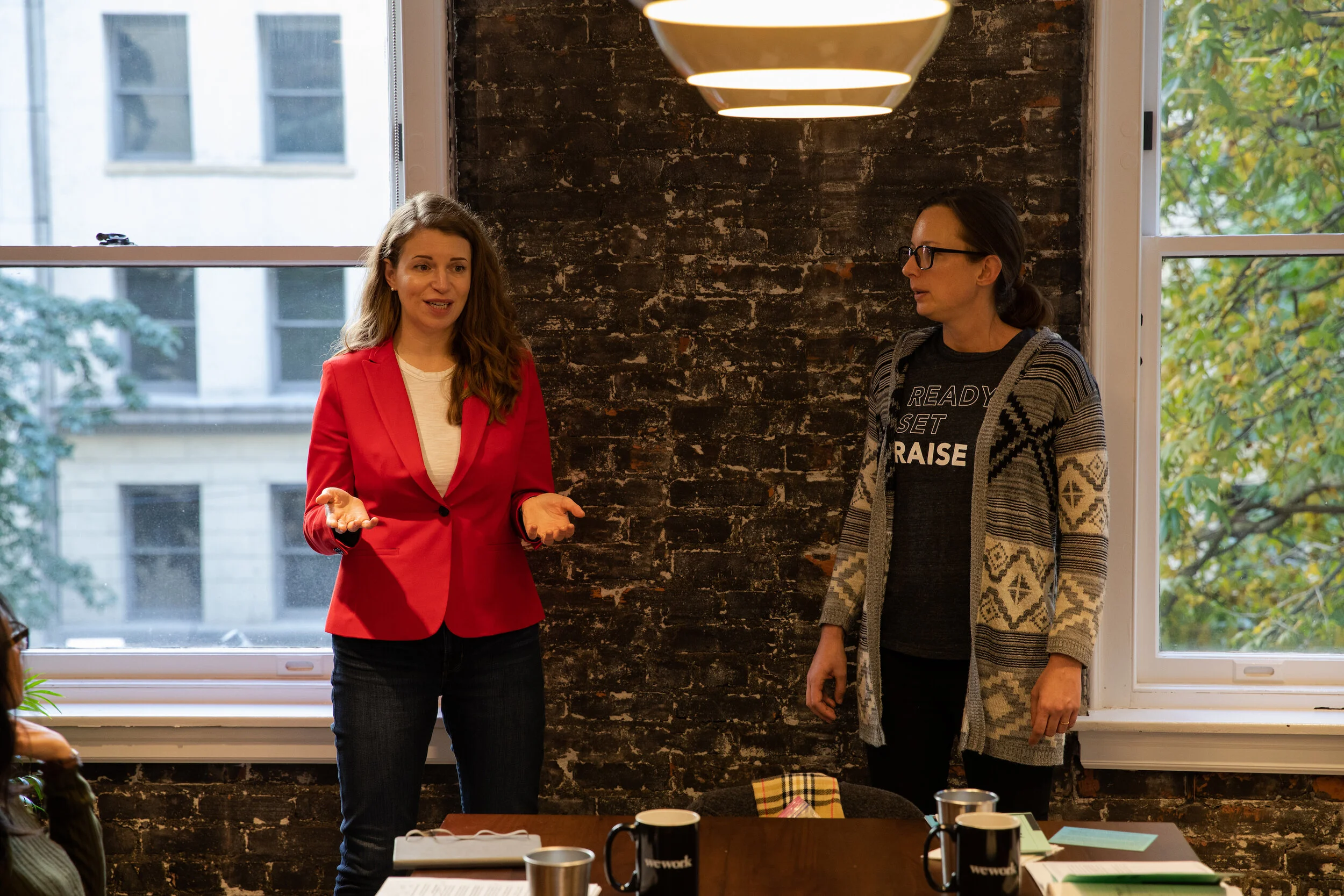©2022 Alicia Dara
One of the things I love best about training groups of women is that they often learn as much from each other as they do from me. After I’ve taught them some Power Voice skills and strategies I always leave time for questions, and I encourage the group to contribute to the answers. They discover all kinds of workplace (and life) issues that they have in common, and start to appreciate each other in a deeper way. For this reason my clients call my group trainings a “team-building exercise”, because through the process of learning new skills and sharing common experiences the women come to genuinely trust each other, and work better together.
In the summer of 2020 I was hired by an amazing group of women in commercial real estate. They had come together with the intention of supporting each other as they advanced in their highly male-dominated field. They wanted me to teach them Power Communication skills, so they could feel confident when speaking up in rooms full of men, and they invited me to give my training during their first annual weekend retreat, which would happen remotely.
By that time my business had fully pivoted to online trainings, and I was excited to be part of their professional development program. My contact in the group was a woman I’ll call Carrie*, who looked a bit like Carrie Bradshaw (from “Sex in the City”) if she wore a business suit and steel-toed boots (which are better than Manolos for touring construction sites!).
In the weeks before my training I spoke with Carrie about some of the challenges that her group faced in their workplaces. She outlined the day-to-day issues that came up for them during work meetings and presentations to potential clients. She also told me that many of her female coworkers suffered from chronic anxiety, and had started smoking as a way of soothing their stress. Recently they had all decided it was time to quit, and planned to support each other through the challenging process of breaking their addiction to cigarettes. Quitting such an addictive habit can be challenging, and it can take a long time, with most people trying to quit several times before they fully stop.
During my training the women were fidgety and restless, as is common when you’re trying to break a difficult and compelling habit. After I finished the first part of the event, when it’s time for questions and answers, I decided to ask about their quitting process. It wasn’t just for my curiosity; I wanted them to share more about their experiences with each other. Most of the women said they had “cut down” that weekend, and were struggling with bad cravings. I could see that some of them looked pinched and exhausted, as if they had just pushed a boulder up a hill, which is what quitting cigs can feel like. But Carrie looked completely serene, and I couldn’t help but wonder ;) what was her secret?
She said, “I went complete cold-turkey. I knew I’d never do it if I tried to cut down gradually. It’s just easier for me to get rid of cigarettes altogether than keep them around and try to resist them. I feel stronger this way!" She also said she felt like she had more control over her choices and how she wanted to live her life.
Everyone was quiet for a minute while they thought about Carrie’s answer. A few of them nodded, like her words were getting through. One woman even went over to her garbage disposal and threw in her last three cigarettes! Clearly something was happening to the group. When I checked in with Carrie a few months later, she told me that four other women quit cold-turkey that day, and none of them had started smoking again. The rest were still working on it.
No judgment! Addictions are terribly hard to break. But there’s another important lesson in Carrie’s story that I think about all the time. It’s about how we can leverage the power of full commitment to activate our resilience and break through big blocks.
I think of full commitment as a kind of invisible freedom that we can choose anytime. It’s not about holding ourselves to an impossible standard, and beating ourselves up if we fail to meet it. It’s actually about creating space for our best, most resilient self to emerge. While it may seem easier to commit halfway to making a big change, we may find ourselves stuck in an endless dance with it, exhausted but unable to stop the music. Yet the longer we dance, the more scared we might become at the thought of breaking free completely. Fear of the unknown can be a powerful barrier to progress. Fully committing to changes can break down that wall.
This doesn’t mean that we should go it alone. We should always reach out for help with our full commitments, especially those that involve our health and wellbeing. For example, Carrie had a good doctor who specialized in addiction treatment, and she also got acupuncture to help her with cigarette cravings. She had a group of non-smoking friends that she could check in with, and she learned a yoga routine for when she felt extra-stressed. All of these things were part of her Full Commitment Plan, and they really worked!
Fully committing to real change is bold and powerful. It’s an intention that should be backed up with actions. It's not easy, but if it's done well it can liberate us from all kinds of things that might be holding us back. It might even free us from an old self-image that no longer fits who we are anymore, and lead us to new levels of personal excellence.
So what can you fully commit to that will give you wings to fly?
*name and some details changed for privacy












